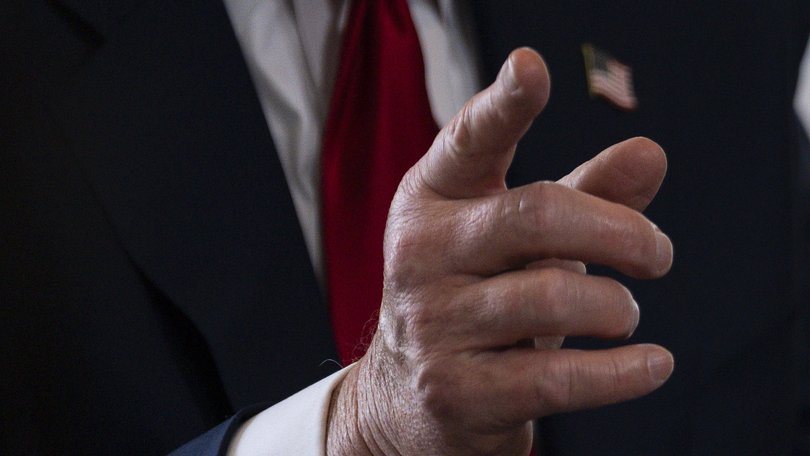THE NEW YORK TIMES: Inside Donald Trump’s assault on capitalism
THE NEW YORK TIMES: Trump’s personalised control of ever-broader swaths of the economy based on ever-thinner pretexts is the beginning of a long trend with neither a political check nor a limiting principle.

Ask an American conservative what makes America great, and at least until about a week ago, he might have said that, among other virtues, it’s a country in which the government stays out of the business of getting in business.
Yes, there are exceptions — Fannie Mae and Amtrak come to mind — but their record of mismanagement and mediocrity would prove the conservative’s point.
Other democratic countries have government-controlled champion enterprises, and some of them, like the Airbus consortium in Europe, sometimes do well. Yet the heavy hand of the state tends to lead to problems over time, including corruption, inefficiency and a reluctance to let bad companies fail.
Sign up to The Nightly's newsletters.
Get the first look at the digital newspaper, curated daily stories and breaking headlines delivered to your inbox.
By continuing you agree to our Terms and Privacy Policy.But American conservatism under President Donald Trump is changing into something unrecognizable, at least to those of us (silly us!) who thought the movement had guiding principles beyond getting, wielding and abusing power. Umpteenth case in point: The federal government becoming an equity shareholder in Intel.
This month, Trump called for the resignation of Lip-Bu Tan, Intel’s new CEO, based on vague allegations that he had invested in Chinese technology companies that US officials say have links to China’s military. (Tan is a US citizen who was born in Malaysia and raised in Singapore.)
Trump also decided to convert nearly $9 billion in government funding promised to Intel under the 2022 CHIPS Act, a piece of industrial policy intended to boost the US semiconductor manufactures, into an equity stake.
“You know what? I think the United States should be given 10 per cent of Intel,” Trump says he told Tan in a White House meeting Friday. Tan speedily agreed. On Monday, Trump boasted on social media that he would “make deals like that for our Country all day long.”
If a Democratic president did this to Tan or any other American CEO, Republicans would call it a political shakedown, an assault on capitalism, a loser for taxpayers. They’d be right. Intel, which had a $500 billion market cap at the turn of the century, is now at $107 billion. What’s to keep it from going lower and taking taxpayers down with it?
As for other arguments for investing in Intel — that it’s systemically important to the US economy (as the banks were in the 2008 financial crisis), that it’s vital for national security (as the critical minerals industry is today), that it’s a symbol of American industrial might (as, arguably, Boeing is) — none of them hold water.
The ecosystem of American chipmakers, from Nvidia to Micron to Qualcomm, is thriving. With about 110,000 workers worldwide at the end of last year, Intel pales in comparison with the largest US companies. If Intel were to fail, or stagger along for years to come, it would simply join the long gray line of America’s corporate has-beens, from Sears to Chrysler to IBM to General Electric.
Instead, Intel is about to become something much worse: a precedent.
In a news release, the company insisted that the government’s stake will be “passive ownership, with no board representation or other governance or information rights.”
That’s like letting a tiger into your house on the solemn promise that it won’t raid the fridge or eat your children. Intel will now join the stable of other cowed and compliant corporations, universities and law firms living in fear of the next Truth Social post, funding revocation or regulatory obstruction.
And that’s to say nothing of the FBI searches that could await those unlucky enough to have once served Trump with insufficient servility.
Republicans now cheering Trump for his daily Big Dog performance should at least wonder what the consequences for America’s economic freedom and competitiveness will be once he makes America statist again.
Trump’s personalised control of ever-broader swaths of the economy based on ever-thinner pretexts is the beginning of a long trend with neither a political check nor a limiting principle.
Especially since ever-greater government control of private enterprise is usually a progressive goal, not a conservative one. A current of neo-socialism now runs through parts of MAGA land, particularly among those who confuse Catholic social teachings with economic reality.
This crew should remember that in democratic politics, two can play the game. What the Trump administration did to “60 Minutes” could be done by a left-wing administration to Fox News or Newsmax. And what Trump is doing with Intel could soon become a template for dozens, if not hundreds, of US companies in which Uncle Sam demands a golden share.
Last year, I said that Republicans would regret a second Trump term and that principled conservatives should not imagine he’s on their side. To them one can only say: It’s going to get worse.
This article originally appeared in The New York Times.
© 2025 The New York Times Company
Originally published on The New York Times
